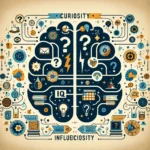The Intriguing Connection Between Curiosity and Intelligence Quotient (IQ)
Understanding the Role of Curiosity in Enhancing Intellectual Prowess
Curiosity is the driving force behind human innovation and progress. It sparks the desire to explore, discover, and learn. But how does this innate trait relate to your Intelligence Quotient (IQ)? Let’s dive into the intriguing connection between these two cognitive facets.
The Science of Curiosity and IQ
IQ, a measure of one’s cognitive abilities, has often been linked to success in various intellectual pursuits. However, intelligence is multifaceted, and curiosity plays a vital role in shaping how one applies their cognitive abilities. Research has shown that curiosity enhances learning and memory, factors that are intrinsic to the development of intelligence.
Cognitive psychologists suggest that curiosity triggers activity in the brain’s reward system. This neurological response is similar to what occurs when we eat our favorite foods or solve a challenging problem – it encourages us to seek out new knowledge and experiences. By stimulating the brain’s pleasure centers, curiosity can increase motivation and persistence, which are essential for intellectual growth and a higher IQ.
The Role of Curiosity in Lifelong Learning
Those who remain curious throughout life are more open to new experiences and ideas. Lifelong learners are constantly expanding their knowledge base and honing their problem-solving skills, leading to potential increases in IQ over time. Educational systems that foster curiosity can often produce students with higher academic achievement and a greater capacity for complex thought.
Moreover, studies have indicated that individuals with high levels of trait curiosity – an enduring interest in all things novel and a tendency to seek out challenges – often score higher on IQ tests. The propensity to engage deeply with puzzles and problems, to ask questions, and to seek solutions, are behaviors linked with both curiosity and intelligence.
Curiosity as a Predictor of Intellectual Development
From an early age, curiosity manifests as a sign of intellectual potential. Curious children tend to ask more questions, delve into subjects with enthusiasm, and seek to understand the world around them. These are early indicators of a developing IQ. Educational experts advocate for nurturing curiosity in children as it is predictive of their capacity to learn and adapt, which is at the core of the concept of IQ.
In the realm of creativity, curiosity and IQ intersect significantly. High-IQ individuals often possess a curiosity that drives them to disrupt traditional thinking patterns and create novel solutions. This innovative thinking is a hallmark of advanced intellectual ability and success in fields that rely on creative problem-solving.
Exploring the Limitations
While there is a clear connection between curiosity and IQ, it is essential to note that curiosity alone does not account for the full spectrum of intelligence. Other factors, such as emotional intelligence, social understanding, and practical problem-solving, are also integral components of a person’s overall intellect. Furthermore, environmental factors, education, and personal experiences profoundly influence IQ, regardless of an individual’s natural curiosity.
Conclusion
The interplay between curiosity and IQ is complex and multi-dimensional. Curiosity not only fuels the pursuit of knowledge but also enhances the cognitive processes linked to high intellectual functioning. By understanding and nurturing curiosity, individuals can potentially foster greater intellectual growth. Schools, workplaces, and individuals would do well to recognize the power of curiosity as a catalyst for learning, innovation, and increased intellectual capability. As we continue to unravel the mysteries of the mind, the intrinsic value of curiosity in relation to IQ becomes ever more evident.

